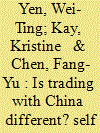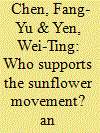| Srl | Item |
| 1 |
ID:
179560


|
|
|
|
|
| Summary/Abstract |
Despite increasing economic integrations with China, worries exist in China's neighboring countries about China's implicit political intention. Do people view trading with China differently? In this article, we incorporate the political context of trade agreements by showing that trade with partners who come with political costs is less likely to be supported. Using a nationally representative survey experiment from Taiwan, we find that trading with China garners less support than trading with Japan or Malaysia, and nationalism suppresses self-interest when the proposed trading partner is China. We show that national attachment, which is neither a proxy for political identification nor a proxy for national chauvinism, becomes a stronger predictor of trade preferences toward China. While the political tension between China and Taiwan is unique, many countries see at least one other country posing a negative externality. Our finding suggests strongly identified nationalists would oppose engaging with a hostile outsider regardless of their self-interest.
|
|
|
|
|
|
|
|
|
|
|
|
|
|
|
|
| 2 |
ID:
157196


|
|
|
|
|
| Summary/Abstract |
The Sunflower Movement—an occupation of the Legislative Yuan (the Congress) for 24 days—was an unprecedented moment in the history of Taiwan. We examine the social foundation of the Movement and explore an important factor that has long been missing in the literature of Taiwanese politics: nationalism. We divide nationalism into three dimensions: national attachment, national chauvinism, and feelings toward other countries. Using original survey data collected six months after the Movement, we find that national attachment (being proud of Taiwan) and anti-China feelings are unique dimensions and both lead to a higher level of support for the Sunflower Movement. National chauvinism, on the other hand, is not associated with supports for the Movement. Furthermore, the impact of nationalism is contingent on sociotropic views. People who express higher levels of nationalism are more responsive to the issue of rising income inequality when evaluating the Movement. The underlying logic is when people are more nationalistic they care more about the potential social impact of expanding socio-economic exchanges with another country. These results point to it being necessary to disentangle various components of nationalism and further investigate their effects on individuals’ political behaviors.
|
|
|
|
|
|
|
|
|
|
|
|
|
|
|
|